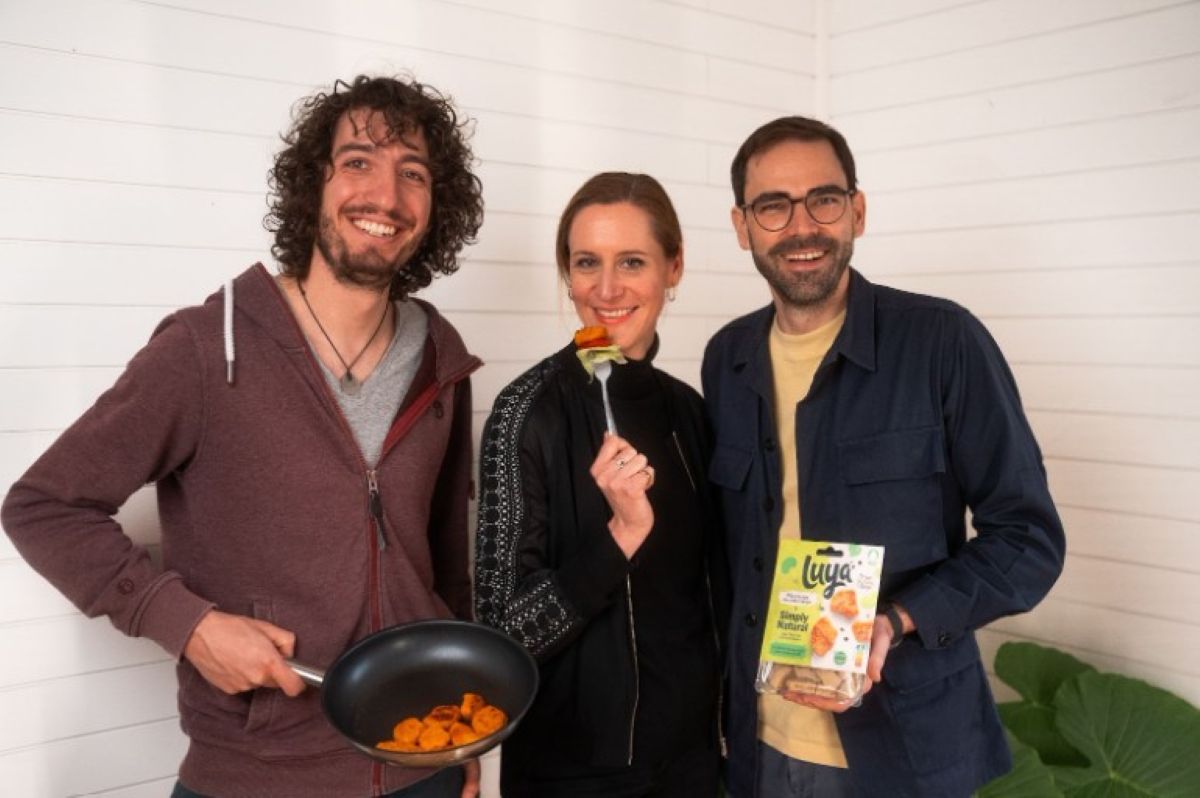Plating up something new with Luya

Want an example of successful collaboration between Valley Partners? Look no further than Luya and the ZFV Group. Find out why the ZFV Group selected Luya as an ingredient for their vegan dishes, how the partnership is progressing, and what makes this foodtech start-up so special in terms of innovation.
A different kind of vegan alternative
Let’s start with two questions. Do vegan alternatives always have a long list of ingredients? And why are they still called “nuggets” or similar, as if they’re meat? These are two questions that Valley food service partner ZFV can answer easily thanks to Luya.
In answer to the first question: No, they don’t. There are just six ingredients on Luya’s product list – 98% of its contents are chickpeas and okara. And additives? Zero.The foodtech start-up’s motto is back to nature and natural ingredients, a return to traditional production methods. It’s this that so impressed ZFV’s kitchen teams and why Luya regularly features on vegan menus across their 200 locations. But what exactly makes Luya so special?
Okara – a valuable by-product
Cutting-edge fermentation cabinets are busy whirring away at Luya’s production facility, located in a former chocolate factory. This traditional production method, familiar to many from their mother or grandmother’s kitchen, is being brought into the modern age. To further develop this method, Luya has invested heavily in research and technology. It’s not just about using natural ingredients and traditional techniques, but also about fighting food waste. Luya uses okara, a by-product of tofu production. Rich in nutrients and valuable components, okara is usually processed into biogas – quite literally burned. At Luya, it now enjoys a second life as a star ingredient. And this is just the beginning – many similar by-products still suffer the same fate. Co-founder Nina Schaller says the Luya team already has several new ideas in the pipeline. We’re very curious to see what else might end up on our plates in the future. Which raises the question…
Why are vegan products still called “stroganoff”, “nuggets”, and the like?
Natural, vegan, and free from additives – Luya products bring variety to plant-based cuisine. But why do they still carry names like “burger”, “stroganoff” or “nuggets”? The answer is a simple one: we buy, cook, and eat what we know. When someone reads “stroganoff” – even if it’s made from okara and chickpeas instead of meat – they already have an idea of how to prepare it and what might go well with it. Luya’s goal is to inspire as many people as possible to try healthy, plant-based products. That’s easier to achieve if people feel confident enough to give it a go. So the naming can be seen as a kind of “user manual”.
Nina Schaller, Luya co-founder, explains: “We deliberately sought out natural, nutrient-rich products and analysed by-product streams. We didn’t shy away from research or the development of technical solutions and processes. One thing became clear: the system needs to change so that by-products don’t just end up in the bin for the sake of convenience. There’s still a lot of potential, and we’ll keep working on it.”
Luya x ZFV – two Valley Partners join forces
Reto Zuberbühler, F&B developer in product management at ZFV, has been busy creating dishes with Luya – for example, the “Luya Korma” with a side of tomato-coconut chutney. The spicy South Asian curry was part of the Veganuary 2025 menu. The ZFV team had their eye on Luya for some time and were all the more excited to finally get it into the pan and onto the plate. With Reto a big fan of fermentation and natural ingredients, he was just as impressed by the ingredients list as he was by the taste.
Never miss a Swiss food innovation morsel.
Latest News
The Cultured Hub unveils plant cell culturing for cocoa, coffee, and other ingredients
Valley partner, The Cultured Hub, has...
Pow.Bio and Bühler join forces to advance next-generation precision fermentation
Pow.Bio, the pioneer in AI-enabled...
The perfect mix of talent and tech: empowering startups in the Swiss food ecosystem
Innovation succeeds when the right...
Tetra Pak acquires Bioreactors.net to accelerate solutions for New Food
Tetra Pak Processing Equipment...



